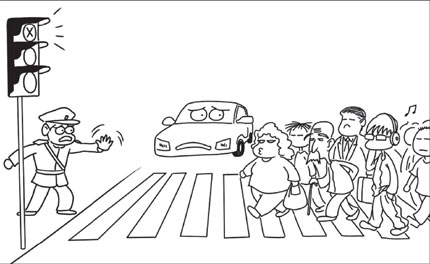
 |
| Illustration by Zhou Tao |
When a jaywalker is caught in the act by traffic police, how does he or she usually react?
If denial doesn't work, then the tactic favored by many in China is to simply point in their defense to other jaywalkers doing the same thing. As they do so, they are confident in the exculpatory Chinese saying that the masses aren't liable for punishment.
And since singling out a jaywalker is considered unfair if others go scot-free, it would be wise for the police to let the individual offender off the hook.
Diffident individual jaywalkers are therefore encouraged because they feel more secure in numbers.
It is common to see Chinese pedestrians follow suit after their patience wears thin and someone crosses against a red light first.
Collective violation of traffic rules, led by a first rule-breaker, has given rise to a buzzword "crossing the street with Chinese characteristics."
Lately Beijing police are cracking down on the perennial jaywalking scourge. While the crackdown has achieved some results, the police encountered considerable obstructionism in the course of performing their duty.
Jaywalkers caught red-handed are nonchalant, glib and audacious in trying to avoid penalties.
For instance, it is reported that when a Beijing policeman stopped an old lady jaywalking and reprimanded her, she snapped back, asking "how many hundred meters can a person walk in life? If I had to detour a few hundred meters (to make a crossing) every day, a chunk of my time would be wasted!"
With the tables turned on him, the officer was speechless.
Also in Beijing, two cyclists stopped for running a red light just walked away in plain sight of the stunned policeman, leaving their bikes behind as if they were bail money; in another case, a suited, decent-looking jaywalker told a policeman he only had 10 yuan, half of the 20 yuan (US$3.20) fine, and challenged the officer to admonish him longer than to make up for the 10 yuan shortfall.
In most cases, officers are pestered with all forms of civil disobedience until they drop the idea of fining jaywalkers, equipped with an arsenal of justifications.
One of the most common excuses is that pedestrians wait longer at red lights than motorists, and standing waiting exposes them to hazardous vehicle exhaust.
This rationale sounds plausible. Given my own observation, it's true that the pedestrian traffic lights at some major intersections in Shanghai, once they turn from red to green, are immediately on a less-than-30-second countdown, forcing pedestrians to scurry across a wide road.
For slow-moving senior citizens, crossing the street becomes a cruel test of fitness. If they don't make it across in time, they are terrorized by onrushing traffic and a din of car horns.
According to Western research, British pedestrians' patience at a red light is 45 to 60 seconds, while Germans can endure a maximum 60 seconds.
The findings of behavioral scientists reveal that after a minute, average pedestrians seem to reach the limit of their patience and jaywalking becomes a tantalizing possibility.
By comparison, people in China are actually more patient than meet the eye, according to research by Tongji University scientists.
A survey of pedestrians in Hangzhou, Zhejiang Province, a city known for its leisurely pace of life, suggests they can wait for as long as 90 seconds.

















 New lease on life
New lease on life
Pay tribute to mothers who have been through Wenchuan earthquake


![]()
